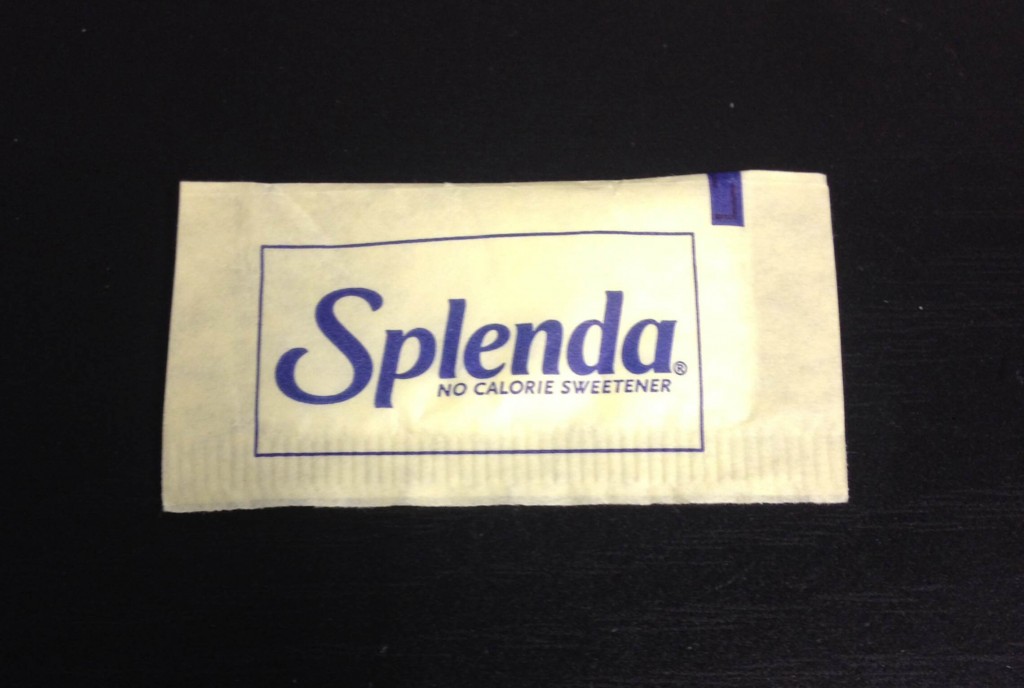We have a terrible habit in this country of losing sight of the “bigger” picture. A prominent area that suffers from this habit is nutrition and food. We get so caught up on “GMO this”, “organic that”, ” low carb”,” low fat” and so on that we forget the most fundamental element of human nutrition – the calorie. One nutritional debate that embodies losing sight of the bigger picture is the “controversy” (I use that term loosely) that surrounds artificial sweeteners.
What are artificial sweeteners?
Before we go further we should define what these are. Artificial sweeteners are sugar substitutes that are synthetically manufactured (Splenda/Sucralose or Aspartame/Equal). They are very attractive alternatives to sugar because they are several hundred times sweeter than sugar (Splenda is 600 times sweeter, for example) , but provide little to no calories due to the way they’re metabolized.
What is the debate?
Some in the nutrition and medical community contend these artificial sweeteners aren’t safe, suggesting they cause cancer, increase risk of diabetes, cause weight gain, result in neurological problems, and cause other assorted health issues. All of this sounds very scary, doesn’t it? Some even go as far to contend that the FDA knew the risks when it approved artificial sweeteners, but, due to bribes and corruption, still approved them for use (these are the same people that believe the FDA was behind the Kennedy assassination and the faked moon landing).
What is the truth?
The research used to support these claims simply doesn’t add up. The overwhelming scientific evidence provides a strong consensus that artificial sweeteners indeed are safe. Much of the research that cites safety concerns used animal models that simply can’t be generalized to humans. Furthermore, many of these studies have other confounding factors and small sample sizes that even further diminish their scientific merit and application to humans. The bottom-line is artificial sweeteners are safe. In fact, if you go the National Institutes of Health’s website or the National Cancer Institute’s website, or do a search on Medline (NIH’s website of scientific journals), you will find not only that artificial sweeteners are safe, but they aid in weight loss and health.
Case in point: in a recent study published in Obesity, the journal of The Obesity Society, subjects who consumed diet soda (made with artificial sweeteners) lost an average of 13lbs, which was 44% more than a control group that didn’t consume diet soda. The diet soda group also noted significant reductions in hunger and saw a greater improvement in cholesterol as well as triglycerides (or blood fats) compared to the non-diet soda group.
What is the take home message?
Please don’t misunderstand my point here: I’m not suggesting consuming artificial sweeteners in massive doses is a good idea, — as with anything, moderation always is the key. I’m also not suggesting we shouldn’t research this area further, because clearly we should. What I am saying is, in a “super-size- it” society that consumes an excessive amount of calories at nearly every turn any opportunity to reduce overall calorie intake without sacrificing taste (making eating fewer calories more enjoyable) should be taken. Don’t lose sight of the bigger picture: fewer calories with the same taste can’t be a bad thing!
About the Author:
-

Michael Stack is the founder & CEO of Applied Fitness Solutions and Frontline Fitness Pros. He is a faculty lecturer for the University of Michigan’s School of Kinesiology. He is also the creator and the host of the Wellness Paradox Podcast, produced in conjunction with University of Michigan.
Michael is an exercise physiologist by training and a health entrepreneur, health educator, and fitness industry advocate by trade. He is dedicated to enhancing the standard of practice of, and advocating for, fitness and wellness professionals to ensure they become an essential constituent in the healthcare delivery system.
With a career spanning over three decades in fitness, health, and wellness Michael has a deep knowledge of exercise physiology, health/wellness coaching, lifestyle interventions to mitigate chronic disease and leadership. He is credentialed through the American College of Sports Medicine (ACSM) as an Exercise Physiologist (ACSM-EP), Exercise is Medicine practitioner (ASCM-EIM), and a Physical Activity in Public Health Specialist (ACSM-PAPHS). Michael is a National Strength & Conditioning Association (NSCA) Certified Strength & Conditioning Specialist (CSCS), and a CDC Diabetes Prevention Program (DPP) Lifestyle Coach.
Michael received his undergraduate degree from the University of Michigan’s School of Kinesiology in 2004 and is currently a Master’s of Public Health (MPH) candidate at University of Michigan, with a specific concentration in health behavior and health education.
Michael is a board of directors’ member for the Physical Activity Alliance and Michigan Fitness Clubs Association. He sits on the University of Michigan’s School of Kinesiology Alumni Board of Governors. Michael is an expert curriculum reviewer for the American College of Lifestyle Medicine. Finally, he is a member of the executive leadership team for American Heart Association’s Heart Walk.
Michael lectures nationally for several health/fitness certification and continuing educations, including; IHRSA, the Medical Fitness Association, the National Strength & Conditioning Association, and SCW Fitness.

